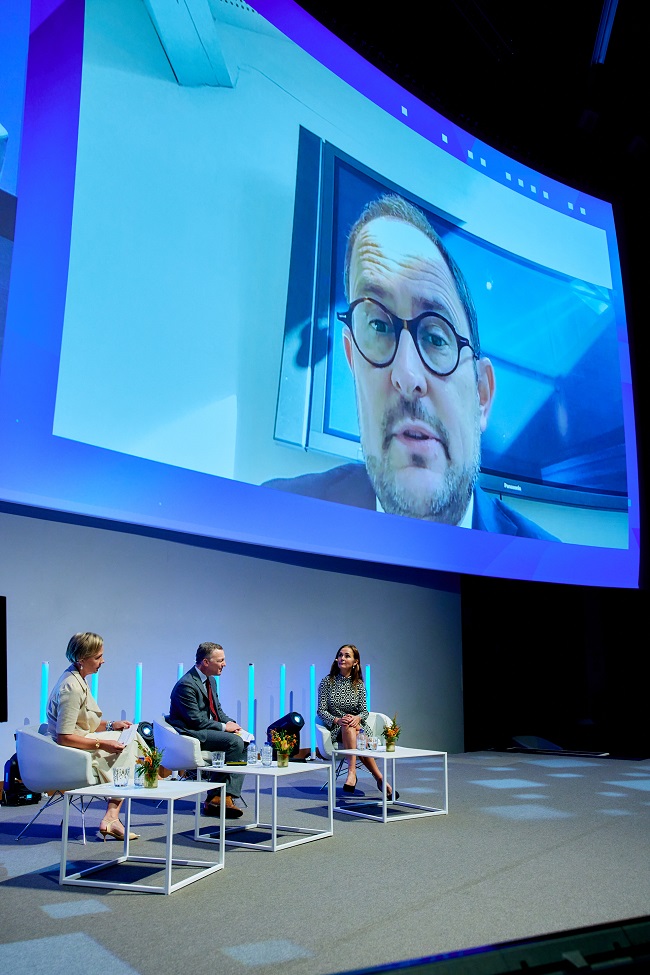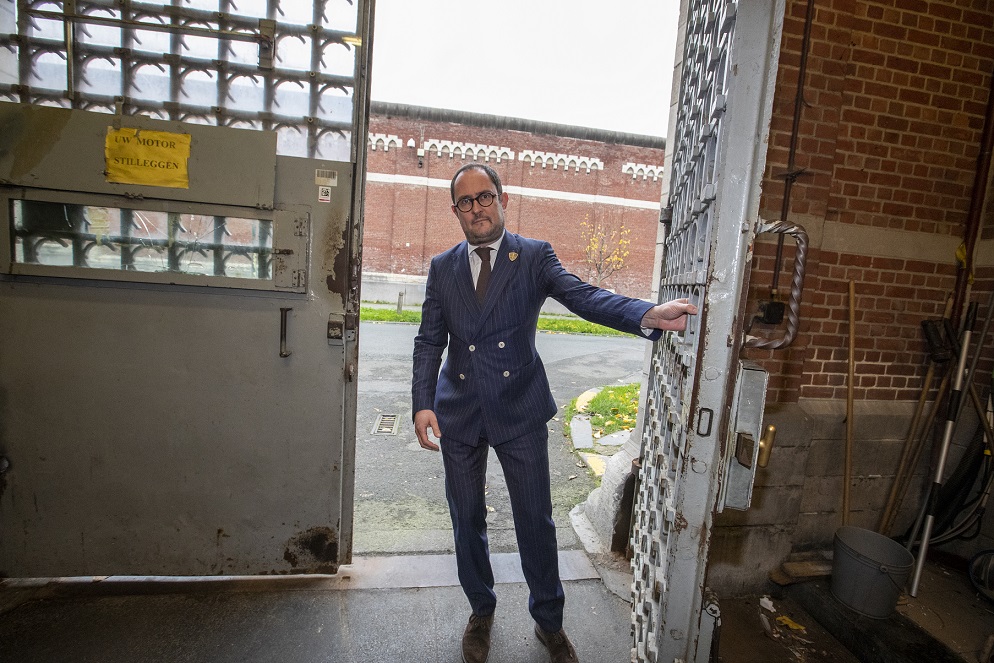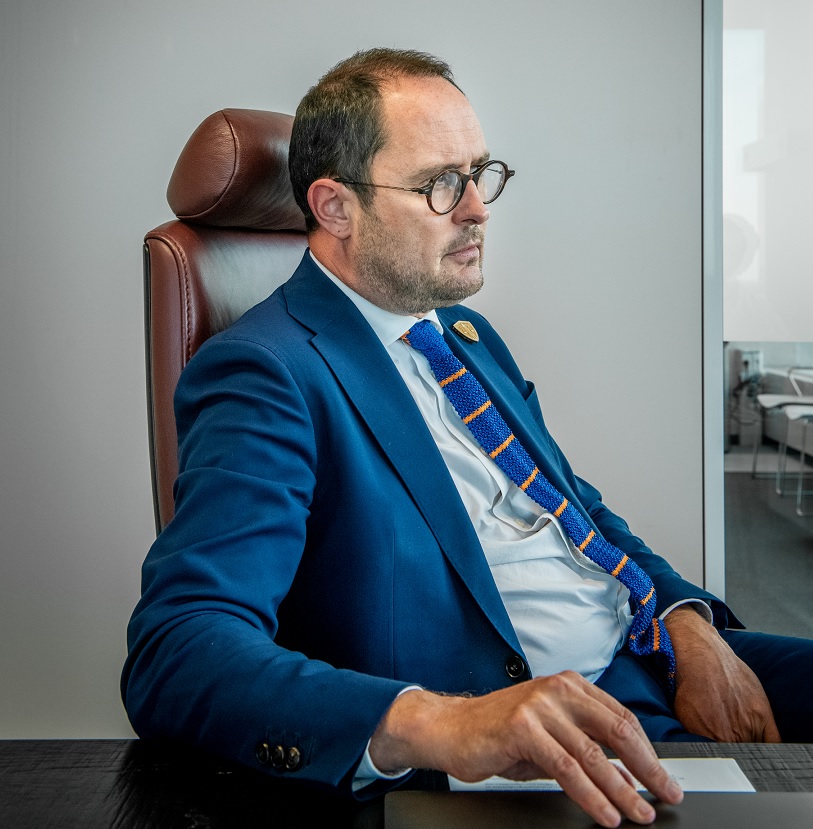On the day we speak, Vincent Van Quickenborne is going back to work in person for the first time in a month after a long spell in hiding. His presence in the federal parliament might suggest cautious optimism, but he’s more cautious than optimistic. Until recently, Belgium’s Justice Minister – along with his pregnant wife and two young children – were living and working in a safehouse due to critical-level threats made by drug cartels.
“Of course, this is a very difficult situation, especially for my family,” Van Quickenborne tells me via video chat. He is allowed out of the safehouse now, but certainly not to meet journalists in person. “I really appreciate the support of my wife because she didn’t sign up for this.”
Their children are six and three. “We explained to them that there are crooks who are trying to take papa away. They do understand it and are coping well,” he says.
This was the family’s second stint in a safehouse. The first was in September, when security services identified a van near the minister’s home in Kortrijk that contained equipment to be used in a kidnapping. Four Dutch nationals were arrested, and Van Quickenborne and his family were allowed to return home. But a second threat was serious enough to move them back to an anonymous location in December.
“The second time was tougher because we were in the safehouse for a full four weeks, and my kids couldn’t go to school. That was more frightening for them. And we cannot rule out having to go into hiding again because we haven’t found out who’s behind the second threat.”

Van Quickenborne speaking to a conference from his safe house
The family are still under heavy guard. “This will not be over in a few weeks or months,” says Van Quickenborne, a member of the Flemish liberal party Open VLD. He suspects it will last until the end of this administration and perhaps longer. “The former justice minister in the Netherlands had to go into hiding just a few weeks ago,” he says.
It is unprecedented in Belgium for a politician and his family to be forced into hiding – and troubling, to say the least. On top of it came the news that an 11-year-old girl died from a bullet in the near-daily gun and grenade attacks on homes and cars taking place in Antwerp’s eastern districts. While it is unclear if this was a drug-related shooting, Van Quickenborne says this sort of incident could become more frequent.
“We have entered a new phase of narcoterrorism in our country,” he says. “This means that the drugs world is threatening the public and decision-makers. I think it will get worse, and I’m afraid that more tragedies will follow.”
That means the battle against the organised drug trade has to be fought. “The last thing I will do is give in,” he says.
Cracking the code
Drug violence has risen to new heights thanks to Sky ECC, the end-to-end encrypted messaging system that was cracked by local authorities in 2021. It gave security services access to six million messages sent among drug kingpins, port workers, crime families and all their lawyers. Authorities followed the messages live for a month before carrying out the biggest raid in Belgian history.
The operation led to hundreds of arrests, €110 million of seized cash and billions in euros worth of cocaine. It was a major blow to the European drugs trade, which moves its products through the ports of Rotterdam and Antwerp.
“It was comparable to what happened in Italy in the 1980s and New York in the 1990s,” Van Quickenborne explains. “We arrested more than 1,400 people in Belgium alone. Every week, more people are arrested. Hundreds of them are in prison. One of the main reasons we have an overpopulation problem in our prison system is because of Sky ECC.”
The operation was successful, but it started a war. “When you take people out of the circuit, the underground starts to get nervous. They start attacking each other and threatening the public and public servants, like judges, the police and legislators. We are seeing a rise across European countries of the kind of violence we experience now in Antwerp and the Netherlands.”

At Vorst-Forest prison, November 2022, as it closed
Meanwhile, Antwerp mayor Bart De Wever uses every drug-related incident in his city to rail against the government. De Wever, who also leads the opposition Flemish nationalist N-VA, vociferously blames the federal authorities for not doing enough to stop the drugs trade and its associated violence.
“The fight is difficult, and it will take a long time,” Van Quickenborne says. “But the fight is not hopeless. We have to break the drug trafficking revenue model. Today about 11 percent of illegal drugs are stopped at the port of Antwerp. According to Europol, if we raise that to 20%, Antwerp will become unattractive to drug cartels.”
Van Quickenborne has overseen many measures to achieve this goal, such as €70 million invested in extra freight container scanning equipment, regular screening of port staff and talks with the five largest freight companies in the world to make containers smarter. “Like you have black boxes in airplanes, we’d be able to see when the container is opened and who is opening it. All those drugs aren’t coming to Europe by bicycle, they’re coming by boat,” he says.
An anti-drugs coalition has been formed with five other countries and an extradition treaty concluded with the United Arab Emirates. “Drug lords are hiding there,” explains Van Quickenborne. “So, we are working with Dubai to get those people extradited to our country.”
As part of the overarching Stream XXL plan to fight drug trafficking, new laws on maritime protection have been passed and more federal police assigned to Antwerp. An additional court dedicated to trying drug crimes has been set up, and a 15-strong port prosecution department will be added this year, solely responsible for drug convictions.
All this is a huge operation, but Van Quickenborne has to manage it while pondering the personal consequences for his family’s safety. But he addresses the issue with calm and clarity, only raising his voice when defending his department against the criticism coming out of Antwerp.
No time for doomsters
“We can do a lot,” he insists. “This is no time to be desperate, to be a doomsayer. And there is no alternative to the plan that we have developed. We asked experts, what should we be doing that we are not doing? There is no answer. We have a plan, we are rolling out our plan. It could go faster, sure, I’m an impatient person myself. It takes time to engage a new judge, it takes six to nine months. I would rather do it in one day, but it’s the public sector, and it takes a lot of time! So this plan has no alternative. The Stream plan is what we have to do. That is my answer to Bart De Wever.”

In his office, in easier times
This being a digital world, it was business as usual for Van Quickenborne from the safe house, and his department is, of course, working on other issues, including a proposal to end the statute of limitations for terrorism. The impetus for this is the ongoing investigation into the Brabant Killers, a group of armed men who opened fire on citizens in public places in the 1980s. No one has ever been arrested, making it the most notorious unsolved crime in Belgium’s history. Van Quickenborne expects his proposal to go to parliament this spring and become law by the summer.
Another of his legislative changes is coming into force this summer: an end to gambling advertising. “Like many countries in Europe, Belgium is struggling with a massive number of gambling addicts,” he says. “Some 40 percent of gambling revenues are generated by addicts. Forty percent! That’s really quite a figure. The social and financial consequences of this are enormous, not to mention the suicides. The gambling industry makes huge profits on the backs of addicts who cannot escape the advertising.”
As of July 1, it is illegal to advertise gambling services on radio, TV, websites, social media, magazines, newspapers and cinemas. The law will also prohibit sending advertisements through emails, messages or post. “That’s 95 percent of all advertising that will disappear,” says Van Quickenborne. And the minimum age for betting will be raised from 18 to 21.
Sport clubs will be given 18 months to finish off current contracts. Anyone familiar with advertising in a football stadium knows how much revenue is generated selling ads to casinos and online gambling sites. “They are not happy with the change, but that’s why we gave them transition periods. And that’s possible, we saw the same thing with tobacco advertising. If you have to pit public health against money, I prefer public health," he says.

